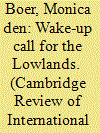|
|
|
Sort Order |
|
|
|
Items / Page
|
|
|
|
|
|
|
| Srl | Item |
| 1 |
ID:
136872


|
|
|
|
|
| Summary/Abstract |
In this article we seek to address the emerging role of the European Union (EU) as a security and intelligence actor from the perspective of counter-terrorism. Intelligence as a process and product has been strongly promoted by the EU as a useful and necessary tool in the fight against terrorism, radicalization, organized crime and public order problems. A range of agencies has been established that collect, analyze and operationalize intelligence in view of strategically defined security threats. Examples are Europol and Frontex. This article makes an inventory of their roles and competences in the field of intelligence and looks at the list of instruments that encourage the sharing of intelligence between different law enforcement and security agencies. Moreover, it is argued in this article that as intelligence becomes more hybrid and as the EU only holds light powers of oversight on ownership and integrity of data, considerable governance challenges lurk around the corner. As ‘intelligence’ is usually a complex and sensitive product, it often travels outside formal bureaucratic channels, which undermines accountability and transparency of where, how and for what purpose the intelligence was gathered.
|
|
|
|
|
|
|
|
|
|
|
|
|
|
|
|
| 2 |
ID:
136871


|
|
|
|
|
| Summary/Abstract |
With the 2001 EU Action Plan and the 2005 EU Counterterrorism Strategy, the European Union has unfolded a roadmap for counter-terrorism measures and an itinerary of actions to be undertaken by the Member States. In some respects, the EU strategies, flanked by the Action Plans in the Area of Freedom, Security and Justice, as well as more concrete forms of cooperation such as the adoption of the EU Arrest Warrant, the Member States have been encouraged to use the same conceptual apparatus, to adopt the precautionary logic (pre-terrorism), and to adopt similar organizational models (multi-disciplinary cooperation) and tools (surveillance, public-private cooperation, etc.). This may have led to a level of convergence between the national counter-terrorism approaches, in line with what the Action Plan on Organized Crime in 1997 sought to achieve by demanding from Member States that they would adapt their national structures. The number of policy-impulses that has emanated from the EU Counterterrorism strategy and ensuing policy documents has been rather numerous. Moreover, this article seeks to take stock of whether all proposals have led to the full adoption and implementation of instruments. The article assesses whether the EU strategies have encouraged ‘deep integration’ between the Member States in terms of a common threat assessment, pooling resources, sharing intelligence, mutual legal assistance in anti-terrorist investigations, creating joint investigation teams and transferring suspects between Member States. The primary focus of this article will be on levels of legal convergence between six Member States.
|
|
|
|
|
|
|
|
|
|
|
|
|
|
|
|
| 3 |
ID:
129578


|
|
|
|
|
| Publication |
2014.
|
| Summary/Abstract |
This article analyses the evolution of European Union (EU) police cooperation on the basis of structural processes in the form of agencification, regulation and standardization, as well as substantive processes in the form of information-sharing and multi-disciplinary cooperation. The Lisbon Treaty holds some key conditions for further integration. The level of integration of police cooperation in the EU is measured by analysing institutional power, the regulatory framework and transnational professionalism. Despite a positive score on each of these levels, member states remain caught between national sovereignty and solidarity. As a consequence, they face an implementation gap and have not embedded European police cooperation in their domestic systems. Building on the pro-integrative moves that have been introduced by virtue of the Lisbon Treaty, improved governance and deeper integration can be achieved by means of more active parliamentary involvement, independent police oversight (both at European and at the national level), the mainstreaming of cooperation mechanisms and a systematic Europe-wide cultivation of police professionalism. Within the realm of internal security cooperation in the EU, a concerted effort is required which demands close consultation between relevant institutional actors and the professional actors in the member states.
|
|
|
|
|
|
|
|
|
|
|
|
|
|
|
|
| 4 |
ID:
080541


|
|
|
|
|
| Publication |
2007.
|
| Summary/Abstract |
The Netherlands is one of the few countries in Western Europe that did not experience massive terrorist attacks and where counterterrorism actions did not feature prominently on the political agenda. Until quite recently, the Netherlands had neither emergency legislation for terrorist incidents nor a specific Act that criminalized terrorist offences. In response to the European Union framework legislation, a bill was produced that penalizes participation in a terrorist organization, flanked by a vast array of other measures. This article analyses the policy, institutional and legislative responses to terrorism in the Netherlands and compares these with responses from other European states. The events of 9/11, as well as the political and public anxiety over the murders of Pim Fortuyn and Theo van Gogh, acted as a firm wake-up call for the Netherlands insofar as the threat of terrorism is concerned. Whilst most countries adopted an incremental approach to countering terrorism, the Netherlands witnessed a radical shift in criminal justice and law enforcement policy following these events
|
|
|
|
|
|
|
|
|
|
|
|
|
|
|
|
|
|
|
|
|